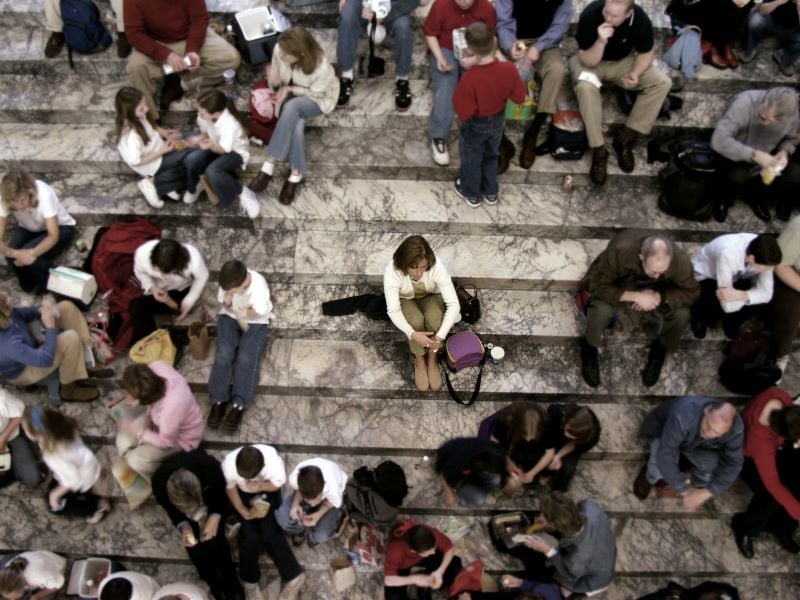The loneliness epidemic is spreading. Trends in our modern world are leaving more people feeling lonely and isolated. Here’s how to deal with loneliness.

“No man is an island”
In 1624 English poet John Donne penned these words: “No man is an island, entire of itself; every man is a piece of the continent, a part of the main.” Donne’s point was that no one can thrive on his or her own, cut off from other people. Human beings are social creatures. We need to feel connected to others.
This is a truth echoed in the Bible. God said in the beginning, “It is not good that man should be alone” (Genesis 2:18). Ecclesiastes 4:9-12 tells us we can accomplish more with others than by ourselves, and that friends can provide comfort and support when we’re down. God designed us to want companionship, rather than isolation; and intimacy, not loneliness.
Drifting apart: the loneliness epidemic
But as much as we need close relationships with other people, concerned experts have been sounding the alarm that chronic loneliness has reached epidemic levels in our modern Western society. One of them is Jacqueline Olds, M.D., associate professor of psychiatry at Harvard Medical School and coauthor of The Lonely American: Drifting Apart in the Twenty-First Century (2010).
“Americans are more isolated and lonely than ever before, despite having seemingly endless ways to stay in touch through communications technology and social media,” Olds says. “Most of us don’t know our neighbors. We frequently change jobs and move, often leaving extended family and friends behind. We feel guilty just talking on the phone with a friend, when we could be working. Ours is a very transient, fast-moving culture, where it’s easy to become socially disconnected.”
Various research groups have conducted studies in recent years, showing the rising prevalence of loneliness.
According to an article in the Nov. 10, 2023, Wall Street Journal, “Americans are now spending more time alone and less time socializing in-person, compared with two decades ago, a trend that started taking hold even before the pandemic. A 2023 Gallup poll found that 17% of U.S. adults—and nearly a quarter of adults under the age of 30—reported feeling a significant amount of loneliness the day before the survey.”
And a study by researchers at the University of Glasgow found “loneliness and social isolation were linked to an increased risk of death from any cause.” Some of the health problems mentioned include anxiety, heart disease and dementia (“Loneliness Tied to Death Risk, Study Finds,” Wall Street Journal, Nov. 10, 2023).
Earlier studies demonstrated that loneliness has been increasing. University of Chicago psychologist John Cacioppo reported in 2013 that 40 percent of adults were lonely, up from 20 percent in the 1980s.

Similar results were found in a 2010 survey by the American Association of Retired Persons: 35 percent of adults older than 45 were chronically lonely, compared to 20 percent a decade earlier. Studies have also been done in Canada, Australia and Europe, with comparable statistics.
Loneliness versus being alone
Of course, being alone doesn’t necessarily mean being lonely, nor is it always something negative. Some people, particularly introverts, genuinely enjoy time by themselves and are quite comfortable with solitude. Even extroverts may desire some solo time each day to reflect and recharge.
Loneliness is different. When we’re lonely, we’re alone not by choice, and we feel sad or empty because of it. We may feel cut-off, alienated or disconnected from other people, and have no one we can really talk to. Even when we’re surrounded by others, we can still be lonely if we don’t have a connection with them.
Almost everyone feels lonely at times, and when we do, it’s usually situational (or short-term) loneliness. This is brought on by changes in our personal lives that sever intimate relationships, such as the death of a loved one, a relationship breakup, relocating to a new city or having good friends move away.
While these circumstances are unpleasant, this type of loneliness is temporary.
Chronic loneliness
If new, lasting relationships are not formed, situational loneliness can turn into chronic (or long-term) loneliness. Having a weak support system or a lack of social skills can also predispose people to chronic loneliness.
Chronic loneliness can persist for years. It can contribute to a number of physical and mental health problems, including anxiety, depression, high blood pressure, high cholesterol, cardiovascular problems, sleep disorders and cognitive decline.
Why are we getting lonelier?
Aside from common life changes associated with situational loneliness, our society is experiencing some major, long-term changes. It’s these shifts in our modern way of life that are thought to be the root causes of today’s loneliness epidemic.
Just look at the way most of us communicate. “Rarely do we talk on the phone anymore,” observes Everett Painter, a counselor at Walters State Community College in Morristown, Tennessee. “Instead, we use social media, which admittedly, can be a great way to connect with others. The problem is, some people only use social media to communicate.”
He says when we rely on online communication rather than in-person or even over-the-phone communication, “our relationships become more superficial, which can make us feel isolated.”
The deepest forms of connection are face-to-face. “When you communicate online, you’re not able to read other people’s body language or hear their tone of voice, and you’re only seeing what others chose to share. So you’re not seeing the ‘whole’ person, and you’re missing a lot of the emotional context and depth,” says Nadine Kaslow, Ph.D., professor of psychiatry and behavioral sciences at the Emory University School of Medicine in Atlanta, Georgia.
Increasing workloads and loneliness
A second major societal trend has been increasing workloads. Social scientists estimate that, on average, American parents each work about 15 hours a day in combination of paid work and household responsibilities. This is double the workload from earlier generations, when moms and dads only had one full-time “job” each.
But it’s not just parents who are busier. “Just about everyone is working longer hours,” Olds says. “We’re taking work home with us at the end of the workday; we’re working weekends; and practically everyone complains about how busy they are.”
With so much to do, “many people decide they no longer have time to devote to friendships, adding to the feelings of disconnection,” Olds says. “Even if you’re free, you may hesitate calling your friends to see if they want to get together, because you assume they’re busy.”
Declining sense of community and loneliness
Our hectic lifestyles have contributed to a third societal change: We’re losing our sense of community. Gone are the days when people talked leisurely over the fence with their neighbors or just dropped by their neighbors’ homes for a friendly visit. Many people have no interaction with their neighbors at all.
However, that’s not just because people don’t have time, Kaslow says. “We have it instilled into us that we cannot trust anyone. We have been forced to become insular and isolated from others in our community, due to fear and anxiety in order to feel safe.”
Not only do we have fewer connections with others in our communities, many of us live far away from parents, grandparents, siblings and other relatives—adding to our feelings of loneliness, Kaslow adds.
Single-person households and loneliness
Finally, a fourth trend is the increase in single-person households. Census Bureau figures show that 27 percent of U.S. households now consist of one person living alone. In contrast, only 10 percent of American households were single-person household in the 1950s. The number of people living alone continues to climb in large part due to the rise in divorce rates, but also because more people are choosing to live by themselves.
“A hundred years ago, it was unusual for people to live on their own because most people couldn’t afford it. Nowadays, with increasing prosperity, more people can afford to live alone, so they do,” Olds says. She believes this is a reflection of American culture, which emphasizes individualism and independence.
“It seems the more prosperous we get, the more we want to live completely on our own, even though it really isn’t good for us,” Olds says. Studies have consistently shown that solo-dwellers are more likely to be chronically lonely than those who live with others.
How to deal with loneliness
“Build time into your calendar to get together with family and friends, just like you would schedule any other appointment. Once you’ve got it on your calendar, it’s much more likely to happen.”
While loneliness is a growing trend in our society, we don’t have to be one of the casualties.
Kaslow says one of the best cures for loneliness is to intentionally pursue quality interactions with others. “Build time into your calendar to get together with family and friends, just like you would schedule any other appointment,” she suggests. “Once you’ve got it on your calendar, it’s much more likely to happen.”
Time together could mean going out to dinner, meeting a friend for coffee, inviting people over to your home, planning an outing of some kind or having a phone date to talk with a long-distance friend.
“You may need to reprioritize your time commitments and juggle your schedule around to find time to be with others, but remind yourself it’s something you really should do,” Painter says. You are building relationships. It’s these connections that prevent loneliness, provide support and enrich our lives in many ways.
If you use social media, this can certainly help you stay connected on some level, but don’t rely on it to nurture your relationships. “Liking” a friend’s post and making status updates hardly qualify as meaningful social interactions.
Painter says digital communication is “best used as a supplement to in-person communication, not as a replacement. If you find the majority of your ‘interactions’ are via social media, or if you are consistently using Facebook or texting to communicate with someone when you could be talking face-to-face, it’s time to unplug.”
You can be alone, even in a crowd.
Another antidote to loneliness is to encourage other people. The Bible shows we should provide for the needs of others in addition to our own (Philippians 2:4). If you know someone who is going through a difficult situation, perhaps feeling lonely, mail a cheerful card or call that person to say hello.
Ask your pastor for names of shut-ins or those who are infirmed and could use a visit and encouragement (James 1:27). Or volunteer at a homeless shelter, nursing home or hospice. When you turn your attention to the needs of others, your loneliness will diminish.
Meeting new people
Put yourself in situations where you can meet new people. Enroll in a class at your community college. Volunteer to be a guide at your city’s art or history museum. Join a bowling league, exercise group or garden club. Sign up for a book discussion group at the library.
“If you are involved with a group of people who have the same interests as you and you see them regularly, over time you will make friends,” says Olds.
Simple pleasantries can also make a difference. Smile and say “hello” to the neighbor you usually brush past on the way to work or to the fellow students you’ve never introduced yourself to when you see them in the library.
The New King James translation of Proverbs 18:24 says, “A man who has friends must himself be friendly.” While other translations render this passage differently, this version makes an important and fundamental point about friendship. A smile is an excellent icebreaker and friend maker.
Developing meaningful relationships
The loneliness epidemic is rampant in our world today. Many people feel cut off and alienated from others. Yet God didn’t intend for us to be lonely. He wants us to live a life filled with meaningful relationships.
If you’re lonely, ask God to help you reach out to others and make time for people. Ask Him to provide you with opportunities to meet and serve others. If you follow His direction, you will develop friendships, which will not only help you feel more connected, but will also enable you to provide support to your friends—old and new.
Read more in the article “What Does the Bible Say About Loneliness?”




